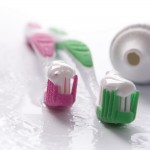
Twice daily toothbrushing with a fluoridated toothpaste (dentifrice) is a well-evidenced recommendation for the reduction of dental caries. Toothpaste also helps remove plaque and debris and a number of manufacturers incorporate sodium bicarbonate (baking soda) as an abrasive. Sodium bicarbonate has a low level of abrasivity and is capable of neutralising acids.
The aim of this review was to test the efficacy of toothpaste containing baking soda on plaque removal and gingivitis compared to toothpaste without baking soda.
Methods
Searches were conducted in the Medline and Cochrane Central databases supplemented by hand searches of the included studies. Randomised controlled trials (RCTs) or controlled clinical trials (CCTs) comparing toothpaste containing baking soda against toothpaste without were considered.
Three reviewers independently screened and selected studies with data being extracted by two reviewers independently. Study quality was assessed by 3 reviewers. Means and standard deviations (SDs) were extracted. The difference of means (DiffM) between the test and control groups was calculated using a random effects model. The evidence was ranked using the Grading of Recommendations Assessment, Development and Evaluation (GRADE) system
Results
- 21 studies providing 43 comparisons were included.
- 9 studies were considered to have a low risk of bias, 6 a moderate risk and 6 a high risk
- 23 comparisons were classified as single use and 20 involved follow-up.
- 12 of the 23 single use comparisons used a positive control and 11 a negative control.
- 16 of the follow-up comparisons used a negative control and 4 a positive control.
- 12 studies considered possible adverse effects. Dislike of the taste of toothpaste was the most reported issue.
- Meta-analysis of plaque scores from the single-brushing experiments showed that baking soda toothpaste was associated with significantly better outcomes than the negative control dentifrices, DiffM= -0.20 (95%CI; -0.27 to -0.12) or
- the positive control dentifrices, DiffM= -0.18(95% CI; -0.24 to -0.12).
- This finding was only confirmed in studies that used a follow-up design as compared to a negative control, DiffM= -0.19(95%CI; -0.34 to -0.04]).
- Indices of gingival bleeding also improved when the comparison was a negative control DiffM= -0.08(95%CI; -0.16 to -0.01] and DiffM= -0.13(95%CI; -0.18 to -0.08).
- For the gingival index scores, meta-analysis did not reveal any significant differences.
Conclusions
The authors concluded: –
Baking soda toothpaste promising results with respect to plaque removal in single-use studies. However, the finding was partially substantiated in follow-up studies. Studies that assessed bleeding scores indicated that a small reduction can be expected from baking soda, relative to a control product.
Comments
This review looked at the ability of baking soda toothpaste to remove dental plaque. Previously this group have also published more generally on toothpastes and plaques removal (Dental Elf – 17th Oct 2017). The earlier review suggested that, in terms of plaque removal there was little difference between brushing with and without toothpaste. This review did suggest some added benefit in single use studies although one has to ask whether a single brushing episode as part of a study is at all representative of routine use. While better plaque outcomes were seen with baking soda in the follow up comparisons these were only noted when compared with negative controls.
15 of the included studies had industry involvement and 5 of the studies used non-marketed products and for a further 3 studies it was unclear if marketed products were used. 12 of the included studies indicated that adverse effects were monitored with a number of patients highlighting taste issues one experiencing a mild burning sensation and moderate dental hypersensitivity.
Links
Primary Paper
Valkenburg C, Kashmour Y, Dao A, Fridus Van der Weijden GA, Slot DE. The efficacy of baking soda dentifrice in controlling plaque and gingivitis: A systematic review. Int J Dent Hyg. 2019 Feb 8. doi: 10.1111/idh.12390. [Epubahead of print] Review. PubMed PMID: 30734996.
Original review protocol on PROSPERO
Other references
Dental Elf – 17th Oct 2017
